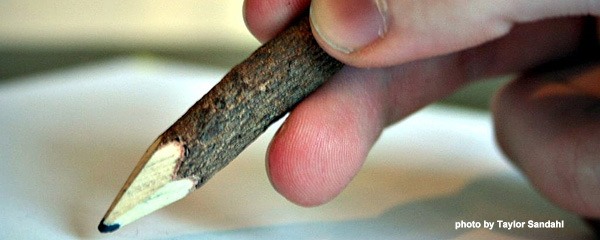
photo by Taylor Sandahl
Own up! How many of you turn first to the biographical notes when handed a new anthology? It’s a terrible confession to make but sometimes I find I’m more curious about who I’m reading than what I’m reading. It’s the literary equivalent of going round a gallery looking at the cards on the wall beside the paintings rather than viewing the art itself.
Then there’s the thorny business of writing the biographical note to accompany my own submissions to publications. In a typical word limit of some 50-100 words there’s only so much you can say. A bit like dating profiles, contributors notes are a genre in their own right. I always used to compose very bland biographies and have never been particularly keen on including too much detail about my personal life outside writing. Although, on the other hand, I suspect that is what people really want to read, something to put the author in a context, however inappropriate that may be to the work being published. For some reason that I’ve never worked out, geographical location, and preferably place of birth (however fleetingly irrelevant), seem to be the popular staples of biographies. And surely the only reason that most of us plough through reading an author’s list of where they’ve had work published is so that we can either be suitably envious/unimpressed, or simply in order to compile a list of publications to target with our own submissions?
There’s also the knotty issue of judging the tone of everyone else’s biographies so that you can fit in with the house style. You don’t want to submit something that trumpets your love of chocolate biscuits and carpet slippers when everyone else is banging on about their long-listing for the Chumleigh-Smythe Prize. Then there’s the first-person or third-person dilemma. Writing something that implies it’s been concocted by someone else is a ridiculous convention, but convention it is, nevertheless. The odd-one-out biography that begins “I…” always comes over as engagingly honest, but sometimes a little naive.
Anyway, in recent years, I’ve developed a habit of sometimes trying to to adapt my biographies to my audience and to match them to the piece of writing they accompany. Hence, I’ve found myself submitting a biographical note that included the line “Pauline Masurel never learned to play the piano.” to go with a short story called Song Without Words and one that began “Don’t talk to me about Pauline Masurel,” for a review of a book called A History of Sarcasm. Perhaps I was taking things a bit too far when I started writing gothic flash fiction in my biographical note to follow a review of Victorian vampire stories? No one loves a smartarse, especially not in a biographical note.
I’ve written crashingly dull biographies that say nothing at all beyond trying to convince people that ‘I am a writer, please take me seriously, because I’ve had things published before.’ In fact, come to think of it, perhaps that’s all the biographical note is there for, a form of self-professed validation? I’ve tried to sound quirky and urban and espouse my love of fire-juggling and extreme punctuation. Who knows if I’ve succeeded in getting down with the kids on the street as a result. Perhaps one of the silliest things I’ve been asked to do was to write a 100-word biography to go with a story that was only 50 words long to start with.
If I ever start to worry that I’ve become completely dysfunctional about my biographical notes then I can console myself that Michael Martone has taken things a stage further and produced a whole book of them, called Michael Martone. Now that, in the nicest possible way, really is daft.
This blog post will be followed by a short biographical note. Just how self-conscious do you think I feel about that?

